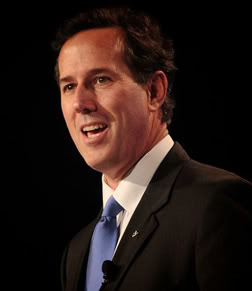 Rick Santorum announced yesterday that next week, in a Western Pennsylvania coal field, he’ll announce he is running for President. The leaked announcement seems to have heavily emphasized the coal field angle, since several major outlets mentioned it prominently.
Rick Santorum announced yesterday that next week, in a Western Pennsylvania coal field, he’ll announce he is running for President. The leaked announcement seems to have heavily emphasized the coal field angle, since several major outlets mentioned it prominently.
On Twitter, Bill Scher asked a compelling question: “Can he win by tarring Mitt, Newt, Tim, Jon w/past cap-trade support?”
I don’t think it will win him the nomination, but there is a segment of the Republican electorate that could be convinced to oppose Mitt/Newt/Tim/Jon solely because of their past support of cap and trade.
Anti-environmentalism has become a matter of faith in the modern Republican party, so predictably, every 2012 Republican presidential candidate has reversed their previous support of addressing climate change.
Mitt Romney went from denouncing coal jobs “that kill people” to opposing environmental laws because they are “bad for business and cost jobs.” Tim Pawlenty went from “come on Congress, cap greenhouses gases now” to “it is a really bad idea, it is going to be harmful to the economy. Newt Gingrich went from advocating for solutions alongside to Nancy Pelosi in an Al Gore funded TV ad to “It is inconceivable that any threat from global warming is big enough to justify destroying the American economy.” Even Sarah Palin thought climate change was a threat that needed to be addressed as recently as 2007.
With former energy industry lobbyist Haley Barbour now out of the picture, Santorum is now the the only consistently anti-environmental candidate Republican primary voters have to choose from.
Santorum’s anti-environmental record and pro-coal credentials have been solid throughout his career, and this might just be how the candidate tries to distinguish himself in a soon-to-be-crowded GOP field.
Consider Santorum’s June 2008 Philadelphia Inquirer piece entitled ‘Coal’ is not a dirty word if we are realistic about saving the Earth, in which he rattled off a laundry list of climate change denial canards. Or look at his appearance in Reno six weeks ago, in which he criticized President Obama and Senator Reid for their opposition to coal production. Or look to 2001, when Santorum touted coal as the future and “environmentally safe.”
During Mr. Santorum’s 2006 Senate campaign, which he lost by 18% to Democrat Bob Casey, one of his top priorities was “improving U.S. energy resources by converting coal into liquid fuels and natural gas.” And in 2003 he supported an awful Bush administration EPA rule to let coal companies upgrade facilities without installing modern pollution controls. In 2009 he called global warming the “latest scientific non-controversy” and accused other politicians of using “science to destroy national economies.”
Santorum’s barely-existent campaign website doesn’t mention coal but it does boldly feature a kickass slogan: Fighting to make America America again. During his second Senate campaign in 2000, when he was challenged by a working-class populist candidate, he wore his grandfather’s career in the coal mines (and subsequent black lung disease) on his sleeve.
You can even look all the way back to 1993, Santorum’s third year in the House, when he worked to exempt coal from an energy tax.
Among Republicans, concern about environmental issues is at an all time low. But how important is a consistent position to GOP primary voters? If they insist on backing candidates who have been consistently opposed environmental laws through their career, Rick Santorum may just have an opening on the issue. If they aren’t concerned about integrity and don’t mind candidates who have held every position imaginable on the issue, Romney, Gingrich, Pawlenty, Palin or one of the other candidates will do just fine.
With all of the said, Santorum’s nascent campaign has a long way to go. A Gallup poll released yesterday has Santorum near the bottom of the pack, attracting support from just 2% of Republican voters.
I’ll be curious to see how whether Santorum tries to use this angle, and how Republican primary voters react if he does so.


